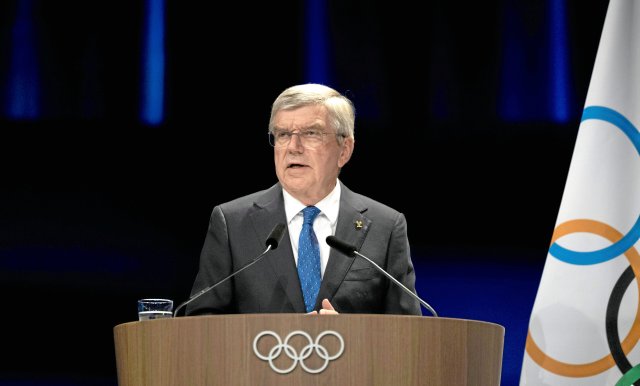IOC President Thomas Bach believes a change in leadership will help the Olympic Committee.
Photo: imago/Xinhua
Thomas Bach’s voice broke briefly. Deeply moved by the moment he announced his imminent departure from the highest office in world sport, the President of the International Olympic Committee (IOC) had to compose himself once again. For the digital age “I am no longer the best captain at my age. New times need new leaders,” said the 70-year-old at the end of the 142nd General Assembly of the International Olympic Committee in the Palais des Congrès in Paris.
Contrary to what many observers expected, Bach does not want to have the Olympic Charter undermined in order to remain at the head of the IOC beyond the term limit that has been in effect since 1999. His successor will be elected at the next meeting of the Olympic Committee next March, and the new boss will take office on June 24, 2025. “A change in leadership will help our organization the most,” assured Bach.
For almost a year, the 1976 Olympic fencing champion left the Olympic world in the dark about whether he would seek re-election. The Würzburg native took over the top position at the IOC in 2013 as the successor to the Belgian Jacques Rogge. After eight years at the top, he was confirmed in office for four more years in 2021. According to the Olympic Charter, re-election is not possible.
Bach: “I was very impressed by the conversations”
At the beginning of the IOC session in Mumbai last October, several IOC members spoke out in favor of reforming the statutes in order to enable Bach to serve another term of office. “These conversations really impressed me and touched my heart,” said Bach about the internal discussions about continuing his presidency.
Citing a recommendation from the IOC Ethics Commission, Bach did not want to comment on his future before the end of the Summer Games in Paris. This also prevented potential heirs to the throne from entering into an open election campaign. The vast majority of current IOC members moved up to the committee under Bach and are therefore associated with the German.
But now Bach is clearing the way. In the midst of a bribery scandal and a deep crisis of trust surrounding the IOC, the lawyer himself helped reform the Olympic agenda in 1999 to include term limits. Bach assured that he now wanted to comply with this requirement in order not to damage the credibility of the IOC.
»I know that I will disappoint many of you with this decision. “I can only ask you to respect that I am convinced that this is in the best interests of our beloved Olympic movement,” the IOC chief said. He thought about it for a long time before making his decision and discussed it in detail with his family.
But Bach made it clear that he was no longer able to cope with the pace of technological change. A new head of the IOC must immerse himself deeply in the digital world, “otherwise our Olympic movement cannot be steered through the high waves of this tsunami,” explained Bach.
Advice on finding a successor
That was probably a pointer for the IOC members. Sebastian Coe, President of the World Athletics Association and Bach’s most recent opponent, is 67 years old and therefore only three years younger than the German. Bach probably wants to prevent the Briton from rising to the top of the IOC.
Other candidates for successor are Juan Antonio Samaranch junior (64), son of the former IOC president from Spain, Prince Feisal bin al-Hussein from Jordan (60) and the Frenchman David Lappartient. The 51-year-old head of the World Cycling Association most recently brought the 2030 Winter Games to France as head of the bid and is one of the rising stars in the world government of sport.
As a signal of change, Bach could also have liked to hand over the scepter to a woman. IOC Vice President Nicole Hoevertsz (60) from Aruba or Zimbabwe’s Sports Minister Kirsty Coventry (40) could be candidates to end the 130-year era of men at the top of the IOC.
Russia’s state doping casts a shadow over the Bach era
In any case, Bach promised an orderly transition and a cultivated field. The summer and winter hosts for the Olympics have already been selected by 2034. There are already a double-digit number of applicants for the 2036 and 2040 games. Bach also referred to the billion-dollar contracts with sponsors and media partners that will last well into the next decade.
Under Bach’s leadership, the IOC passed a series of reforms that made the Olympic Games more modern and financially successful. At the same time, the former president of the German Olympic Sports Confederation was repeatedly accused of having an autocratic leadership style and being too close to Kremlin boss Vladimir Putin and China’s head of state Xi Jinping.
The scandal surrounding Russia’s state-organized doping at the 2014 Winter Games in Sochi casts a huge shadow over the Bach era. During his time in office, the Olympic Games were also surrounded by corruption scandals. Especially in his home country, many people continue to view Bach and his IOC very critically.dpa/nd
Become a member of the nd.Genossenschaft!

Since January 1, 2022, the »nd« will be published as an independent left-wing newspaper owned by the staff and readers. Be there and support media diversity and visible left-wing positions as a cooperative member. Fill out the membership form now.
More information on www.dasnd.de/genossenschaft
sbobet88 sbobet akun demo slot sbobet
